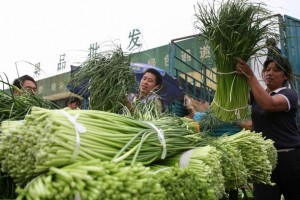Despite the acknowledged slowdown to single-digit GDP growth, some economic indicators suggest that the domestic Chinese economy is faring moderately well amidst the global financial turmoil, including the latest released figures on consumer spending, FDI and inflation.
From the AP:
China’s retail sales remained robust in October, a positive sign for Chinese leaders who want to boost consumer spending to insulate the economy from a global slowdown.
Retail spending rose 22 percent in October from a year earlier, the National Bureau of Statistics said Wednesday. That was down from September’s 23.2 percent growth but still one of the strongest months on record.
In addition to consumer spending, FDI was also up on an annualized basis. From Bloomberg:
Foreign direct investment in China climbed 35.1 percent to $81.1 billion in the first 10 months of 2008 from a year earlier.
[…]The government’s Nov. 9 pledge to boost spending on housing and infrastructure to sustain growth may encourage overseas investors to keep channeling money into the fourth- biggest economy. PepsiCo Inc., the world’s largest snack maker, said it plans to invest $1 billion in China in the next four years to increase production and sales.
Inflation has steadily decreased, and it was recently announced by the National Bureau of Statistics that China’s inflation rate fell to 4 percent in October, consistent with this forecast from TIME:
After wrestling to control rising inflation over the past 18 months, the government reported recently that China’s Producer Price Index “declined sharply to 6.6% year-on-year in October, from 9.1% in September,” Ulrich of JPMorgan wrote in her report. She noted that the Consumer Price Index, which will be released this week, will also moderate further from last month’s level of 4.6%, which was the fifth successive monthly decline.
Tempering expectations of the $586 billion stimulus package’s efficacy, TIME also reports that:
“I think that we’ll see a couple of weak quarters in 2009,” Simpfendorfer says. While the size of the package was welcome, “it’s the speed of its implementation that is really important,” he says. “My concern is that the contraction in demand will take place before the fiscal policies have time to take effect.” To an economy heavily dependent on exports, that period between stimulus and response could have significant implications. With up to 2.5 million migrant workers in the Pearl River Delta forecast to lose their jobs in the coming months as the worldwide economic crunch deepens and many already flooding back home to their villages, some political analysts have expressed concern that social unrest in rural areas could worsen.








